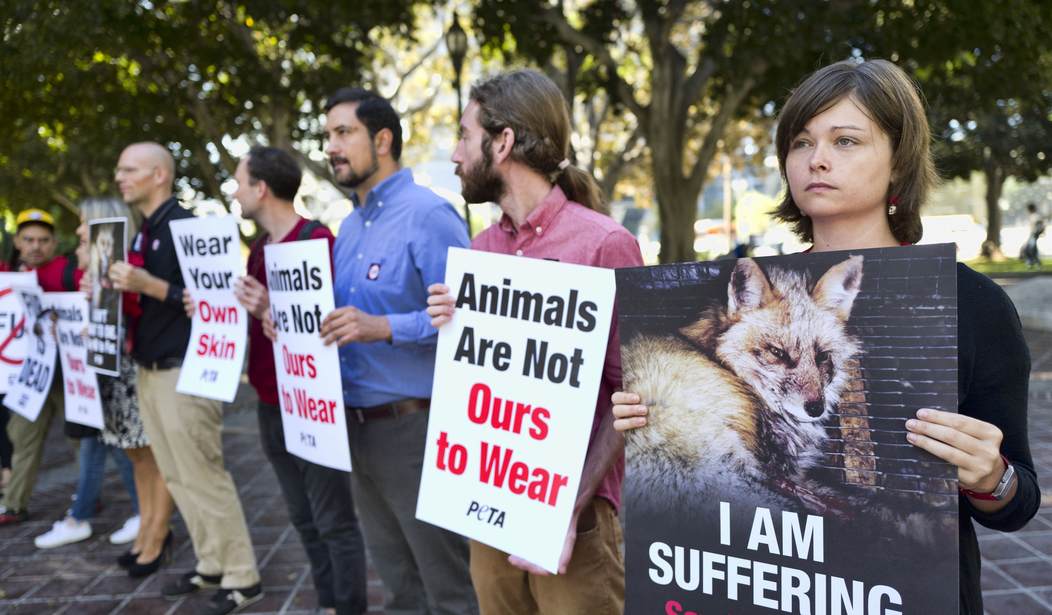Animal rights activists want to ban hamburgers, zoos, and pet ownership–an un-American agenda that no conservative would support. But animal rights lobbyists think if they can deceptively throw around “China” and “states’ rights” enough times, they can trick conservatives into supporting their agenda.
That’s what is at the heart of the fight over legislation on Capitol Hill called the Ending Agricultural Trade Suppression (EATS) Act–a bill that has dramatic ramifications for the cost and availability of food in this country.
Do you think the government should be telling farmers how to farm? Do you think that California should be regulating farmers in Iowa, North Carolina, and the other 47 states?
If you answered no to either question, you should support the EATS Act.
Animal rights groups want to ban all farm-raised meat, eggs, and dairy products. They think “meat is murder,” to quote PETA. But they know most Americans don’t support this notion. So instead, they focus on passing laws that make meat, eggs, and dairy products more expensive and less available.
In the past several years, animal rights groups have financed ballot measures in California and Massachusetts that attack farming and consumer choice. These measures ban farmers in these states from using common, veterinary-approved animal husbandry practices.
Importantly, these laws also ban the sale of pork and eggs produced in other states using these animal husbandry practices. If you’re an Iowa farmer, you won’t be allowed to sell pork or eggs to Californians unless these products are “California-compliant.”
Recommended
Because of how the agriculture markets and processing works, the effect of these laws isn’t limited to California or Massachusetts. They will raise prices for pork and eggs across the country when they go into effect.
And animal rights activists are already salivating at passing more of these laws in states like Colorado, Oregon, or Washington. Their scope will expand to raise the cost of beef, dairy, and other natural animal-based foods most of us enjoy.
The EATS Act would nullify these laws. It would prevent California or any other state from banning the sale of legally produced agricultural products. If California wants to pass laws attacking farms inside its own borders, it can do that–just as it has done with many other silly laws. But it can’t spread the pain around.
Imagine if there were 50 different state standards for selling meat. It’d be chaotic and impractical–which is exactly the reason the Founding Fathers protected interstate commerce in the Constitution. The EATS Act upholds basic Constitutional principles.
But animal rights groups are running deceptive campaigns aimed at convincing conservatives to oppose the EATS Act.
This summer, animal rights lobbyists launched digital ads aimed at conservative audiences claiming the EATS Act helps China. It’s a bogus argument. If anything, the EATS Act hurts China because it ensures America remains a strong food-producing nation. China imports huge quantities of food from our farmers, which is a strategic advantage for our country. (It’s always good to have an opponent rely on you for critical things–especially considering we rely on China for other important goods, like medicine).
The second argument trotted out by animal rights lobbyists is that the EATS Act tramples on states’ rights. “[T]he EATS Act could strip all states of their traditional authority to enact standards for the in-state production and sale of any agricultural products,” says the Humane Society of the United States (HSUS), a leading funder of the California and Massachusetts ballot initiatives. (HSUS is unaffiliated with your local humane society.)
Once again, this claim is bogus. The EATS Act is about protecting interstate commerce. California will still be free to pass dumb laws that affect California businesses.
Animal rights lobbyists have even conscripted a couple of “scarecrow” groups to do their bidding. These groups have names like “Farm Action” and give the appearance of farmers supporting these trade barriers. Their representation of farmers is as phony as their arguments.
Ask yourself: Should you be allowed to buy the food you want to eat? Or should the government tax and prohibit foods you want to eat at the behest of animal rights activists?
Biden-flation has been bad enough, with the price of food jumping 6 percent in 2021, 10 percent in 2022, and is on track to increase another 6 percent this year.
If you want affordable food and choice, support the EATS Act. Otherwise, when bacon is $20 a pound, you’ll hunger for it.
Will Coggin is a Vice President of Research at Berman and Company.

























Join the conversation as a VIP Member